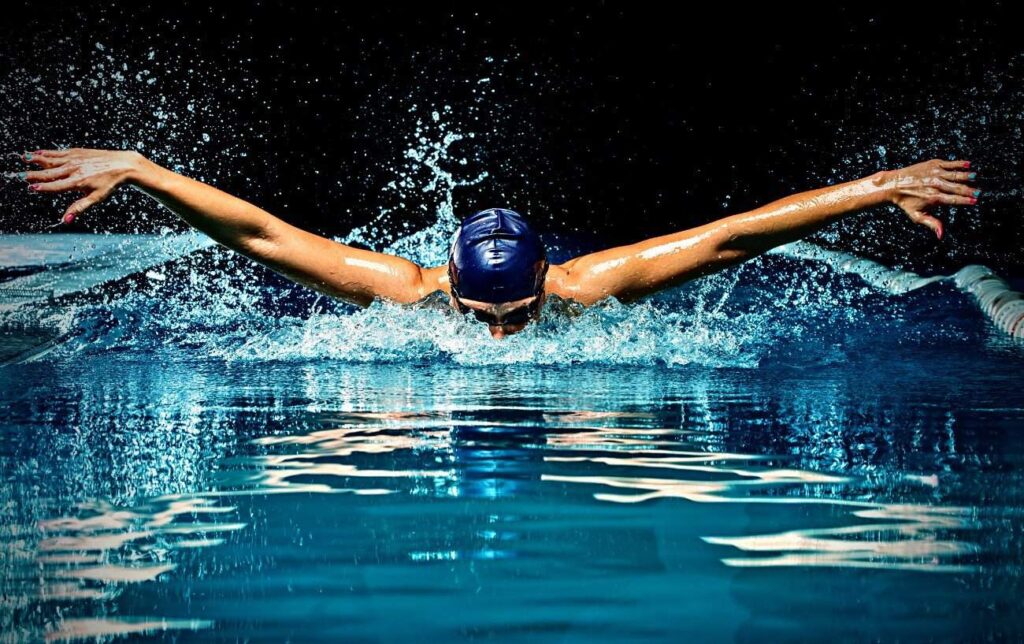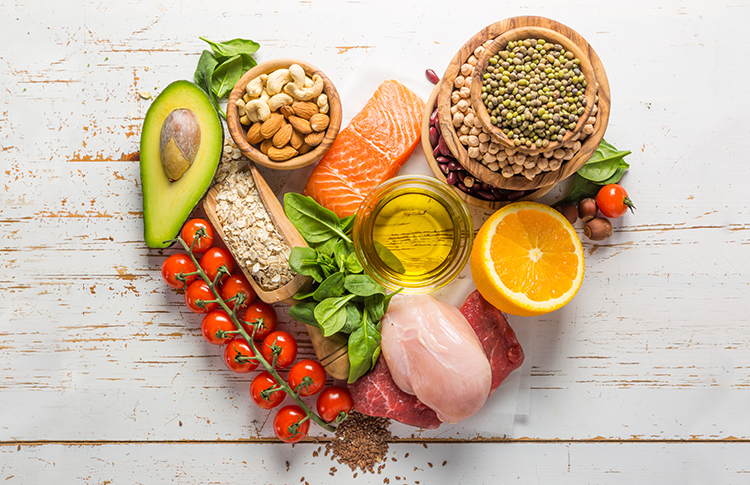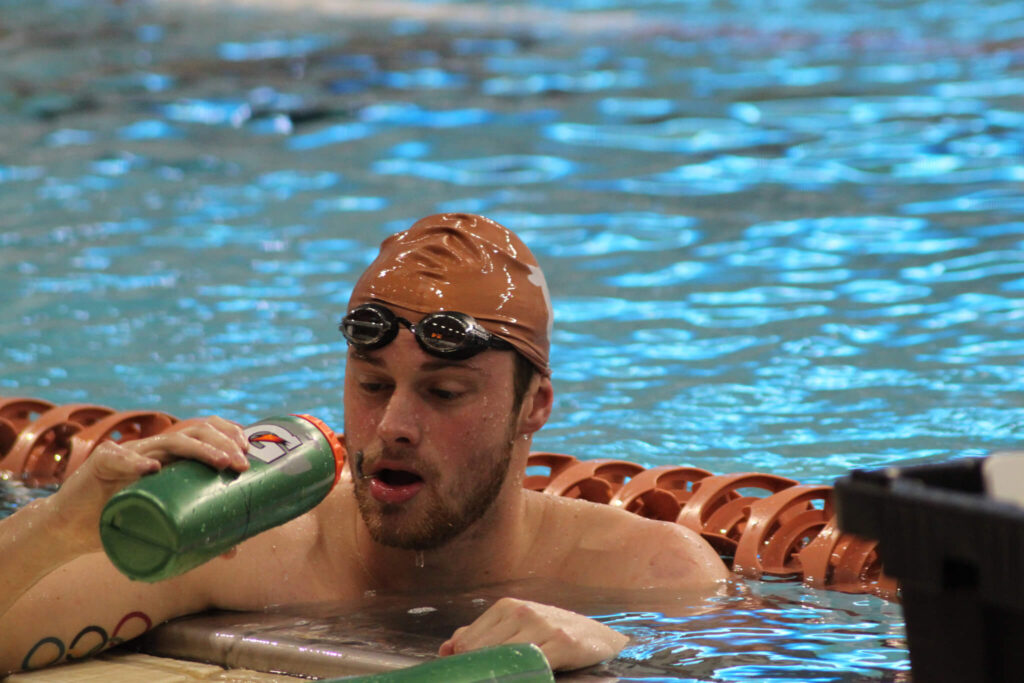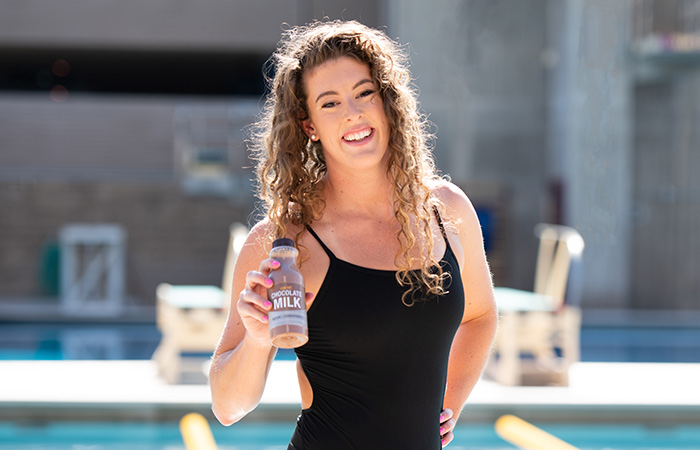Navigating a swimming diet plan effectively can greatly enhance weight loss and improve performance in the pool. This article explores various aspects of a swimmer’s diet, emphasizing the importance of what you eat, when you eat, and how you maintain hydration and nutrition to support your swimming goals.
Key Takeaways
- Understand the energy demands of swimming and adjust your diet for adequate nutrition.
- Set realistic dietary goals that align with your swimming schedule and weight loss targets.
- Incorporate a balanced diet rich in lean proteins, low in excessive carbohydrates, and sufficient in fats and fibers.
- Monitor your hydration levels diligently as it plays a crucial role in weight management and performance.
- Regularly assess and adjust your diet based on your body’s response and progress in swimming.
Kickstarting Your Swimming Diet Plan for Weight Loss
Understanding the Basics
Starting a swimming diet plan for weight loss involves more than just spending hours in the pool. It’s crucial to balance your calorie intake with the energy you expend. Swimming is a high-energy activity that burns a lot of calories, so your diet needs to support your body’s increased demands.

How to swim to lose weight
Setting Realistic Goals
When embarking on a swimming diet plan, setting achievable goals is key. Aim to gradually reduce calorie intake and increase swim time, ensuring you don’t push your body too hard too soon. This approach helps maintain motivation and prevents burnout.
Getting Started
To kickstart your swimming diet plan, begin by assessing your current diet and making necessary adjustments. Incorporate a variety of nutrients to support your swim workouts and overall health. Remember, a well-rounded diet is the cornerstone of any effective weight loss strategy.
What to Eat: Crafting Your Swimmer’s Diet
Swimming and Calorie Intake
Understanding your calorie needs is crucial as a swimmer, especially when aiming for weight loss. Caloric intake should be tailored to your training intensity and body composition goals. It’s not just about eating less; it’s about eating right to fuel your body for both performance and recovery.
Achieving a Balanced Diet
A swimmer’s diet should be a well-rounded mix of carbohydrates, proteins, and healthy fats. Carbohydrates are the primary fuel source, especially important for high-intensity workouts. Proteins are essential for muscle repair, and healthy fats help with inflammation and overall health. Remember, balance is key to maintaining energy and supporting your body’s needs.
Foods for Before and After Swimming
Eating the right foods before and after swimming can significantly impact your performance and recovery. Pre-swim meals should focus on easy-to-digest carbohydrates for a quick energy boost. Post-swim, it’s important to replenish with a combination of carbs and proteins to aid in muscle recovery. Snacks like pasta salad, plain sandwiches, and fruits such as bananas and apples are great choices.

What to eat before swimming?
Hydration: The Unsung Hero of Weight Loss
How to Stay Hydrated
Hydration isn’t just about drinking water; it’s about making sure you’re drinking enough at the right times. Always have a water bottle handy, especially during workouts. Start hydrating well before you dive into the pool and keep sipping throughout your swim.
The Role of Water in Weight Management
Water is crucial not just for survival but for effective weight management. It helps in metabolizing fat and maintaining a feeling of fullness, which can prevent overeating. Remember, a well-hydrated body functions at its best!

Water is very necessary for swimmers
Timing Your Hydration
It’s not only about how much you drink, but when you drink it. A basic rehydration strategy may then be developed to replace fluid losses after training. Don’t forget to listen to your body, and drink according to your thirst levels, not just a set schedule.
Meal Timing and Frequency
Eating Little and Often
Eating smaller, more frequent meals can help maintain energy levels throughout the day, especially important for swimmers who need consistent performance. Aim for 4-6 small meals spread over the day, each packed with nutrients to fuel your body and aid in recovery.
Best Times to Eat for Swimmers
Timing your meals around your swim sessions can significantly impact your performance and recovery. A good rule of thumb is to eat a balanced meal 2-3 hours before swimming to ensure you have the energy to sustain your workout. Post-swim nutrition is crucial for muscle recovery and optimal results. Focus on nutrient-rich foods, avoid processed foods, and stay hydrated. Seek professional guidance for personalized plans.
Pre and Post Swim Nutrition
Pre-swim, focus on light meals or snacks that are easy to digest and provide a quick source of energy, like bananas or oatmeal. Post-swim, it’s important to replenish your body. A combination of protein and carbohydrates works best to repair muscles and restore energy levels. Here’s a quick guide:
- Immediately post-training: 20g whey protein powder + 20g maltodextrin/dextrose in water
- Evening meal (45 mins later): Choose lean proteins and complex carbs like chicken breast and sweet potatoes, accompanied by plenty of vegetables.
Supplements and Your Swimming Diet
When to Consider Supplements
Supplements can be a game-changer for swimmers looking to enhance performance and recovery. It’s crucial to consider them when your dietary intake might not meet all your nutritional needs, especially during intense training periods. Common scenarios include increased training loads or when aiming to boost specific nutrients that are hard to obtain in sufficient amounts from food alone.

Choosing the Right Supplements
Choosing the right supplements involves understanding what your body needs to swim faster and swim better. A balanced approach often includes a mix of multivitamins, minerals, and specific supplements like omega-3 fatty acids, which are vital for reducing inflammation and improving heart health. Here’s a quick guide on some popular supplements:
- Vitamin C and E: Antioxidants that help reduce oxidative stress.
- Iron: Essential for oxygen transport in blood.
- Calcium and Vitamin D: Important for bone health.
Natural vs. Synthetic Options
When it comes to supplements, the swimming community often debates between natural and synthetic options. Natural supplements are generally derived from food sources and are considered gentler on the body. However, synthetic supplements might be necessary when higher doses are required or when specific compounds are not readily available in nature. It’s essential to consult with a healthcare provider to determine the best choice for your swim nutrition needs.
Monitoring Progress and Adjusting Your Diet
Tracking Your Diet and Performance
If you measure it, you can change it. Use a food diary app or pen and paper to track your calorie intake and the nutrient profile of the foods you eat. Regularly graph your body weight or body fat percentage to visually track progress and stay motivated.
![]()
When to Tweak Your Diet
Adjustments to your diet should be made based on consistent tracking and performance outcomes. If you’re not seeing the desired results after a few weeks, consider tweaking your macronutrient ratios or overall calorie intake.
Listening to Your Body
Always listen to your body’s signals. If you feel fatigued or notice a drop in performance, it might be time to reassess your diet. Ensure you’re not only eating enough but also getting the right balance of nutrients.
Remember, the key to effective diet adjustments is a combination of careful tracking and being attuned to how your body feels.
Common Mistakes to Avoid in Your Swimming Diet Plan
Overlooking Micronutrients
Micronutrients, like vitamins and minerals, are crucial for optimal body function, especially when you’re pushing your limits with styles like the back stroke in swimming or the butterfly stroke. Make sure your diet isn’t just about macros; micronutrients matter too!
Ignoring Signs of Dehydration
Dehydration can sneak up on you, especially if you’re focused on intense training sessions. Drink plenty of water throughout your sessions and the day to keep your performance at its peak.
Neglecting Meal Timing
Timing your meals can significantly impact your energy levels and recovery. Eating the right foods at the right times, especially pre and post-swim, is key to maintaining energy and aiding recovery. Here’s a quick guide:
- Pre-Swim: A light meal or snack high in carbs, moderate in protein, about 1-2 hours before swimming.
- Post-Swim: A meal rich in protein and carbs within 30 minutes to kickstart recovery.
Avoiding common mistakes in your swimming diet is crucial for optimal performance. Whether you’re a competitive swimmer or just swim for fitness, understanding the right nutritional balance can make a significant difference. Visit our website to explore comprehensive guides and personalized advice on crafting the perfect diet plan for swimmers. Dive into our ‘Nutrition for Swimmers‘ section for expert tips and strategies.
Wrapping It Up
Alright, swim fans! We’ve dived deep into the essentials of a swimming diet plan tailored for weight loss. Remember, it’s not just about cutting calories but fueling your body with the right nutrients to keep you swimming strong. Lean proteins, healthy fats, and hydration are your best pals in the pool. Whether you’re setting new records or just swimming for fitness, a thoughtful diet is your secret weapon. So, keep these tips in mind, hit the water, and watch those pounds melt away as you lap up success!
AUTHOR
Sang Nguyen
Sang Nguyen is a former national swimmer for Vietnam who has transitioned into coaching. With a passion for fostering a healthy swimming community and connecting like-minded individuals,......Read More
BLOG
Maybe You Are Interested
Good Swim Meet Snacks: What to Eat for Optimal Performance
Good nutrition is crucial for swimmers to maintain energy, recover quickly, and perform at their...
Read More...Optimizing Your Performance: The Best Diet for Swimming Training
Optimizing your performance in swimming is not just about rigorous training; it’s equally crucial to...
Read More...Achieve Peak Performance with This Diet Chart for Swimmers
Whether you’re a novice or an expert swimmer, understanding the right diet is crucial for...
Read More...Eating Like a Champion: Exploring the Diet of Michael Phelps
Michael Phelps, renowned for his Olympic triumphs, has a diet as extraordinary as his swimming...
Read More...Muscle Gain for Swimmers: Tailoring Your Diet for Strength
Swimming is a demanding sport that requires a tailored approach to nutrition to support muscle...
Read More...A Comprehensive Diet Plan To Gain Weight For Swimmers
Swimming is a demanding sport that requires meticulous attention to nutritional needs to optimize performance,...
Read More...